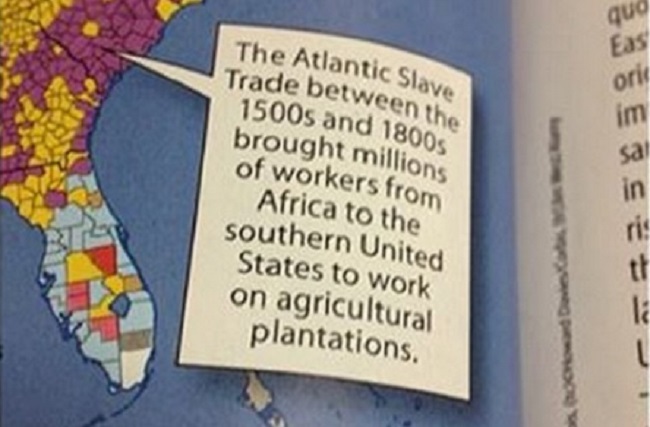-
Tips for becoming a good boxer - November 6, 2020
-
7 expert tips for making your hens night a memorable one - November 6, 2020
-
5 reasons to host your Christmas party on a cruise boat - November 6, 2020
-
What to do when you’re charged with a crime - November 6, 2020
-
Should you get one or multiple dogs? Here’s all you need to know - November 3, 2020
-
A Guide: How to Build Your Very Own Magic Mirror - February 14, 2019
-
Our Top Inspirational Baseball Stars - November 24, 2018
-
Five Tech Tools That Will Help You Turn Your Blog into a Business - November 24, 2018
-
How to Indulge on Vacation without Expanding Your Waist - November 9, 2018
-
5 Strategies for Businesses to Appeal to Today’s Increasingly Mobile-Crazed Customers - November 9, 2018
Textbook publisher re-writes book after portraying slaves as ‘workers’
The textbook also mentioned that “indentured servants” from Europe received “little to no pay”, and yet, she pointed out, there is no mention of slavery and all the harsh, unpaid work that slaves had to do.
Advertisement
Many of you asked about my son’s textbook.
In an interview with the Washington Post, Dean-Burren was straightforward: “This is erasure”, she told the paper.
“Dean-Burren shared the statement on her Facebook page in celebration with the hashtags “#blackboysmatter” and “#blacklivesmatter”.
Textbook company McGraw-Hill announced that they are making a few major edits this week, after it was discovered that a section of one of their world geography textbooks referred to slaves brought to the United States during the Atlantic Slave Trade as “workers” in a section of the book about “patterns of immigration”.
On 1 October, Ms Roni Dean-Burren posted a photo of a caption of a picture from her son’s geography textbook, and since then it has gone viral, gotten America talking – and prompting the publisher of the book to make corrections to the caption. “It just says we were workers”. In the video, which has been viewed more than 1.5 million times, she explains why referring to slaves as “workers” is detrimental to history.
Dean-Burren elaborated on the issue in a video she posted to Facebook the following day. The publishing giant maintains that “This program addresses slavery in several world lessons and meets the learning objectives of the course”, but promised to clarify the caption’s language about slavery.
“We believe we can do better”, the publisher wrote.
Hundreds of thousands of Africans were enslaved and forced to work without wages in the US during the 18th and 19th centuries, according to Slave Voyages, a project of Emory University.
The company issued an apology on Facebook and admitted that the book “did not adequately convey that Africans were both forced into migration and to labor against their will as slaves”.
The changes will be made in the digital version of the program immediately and will be included in the program’s next print run, the publisher said.
Advertisement
McGraw-Hill Education is committed to developing the highest quality educational materials and upholding the academic integrity of our products.





























